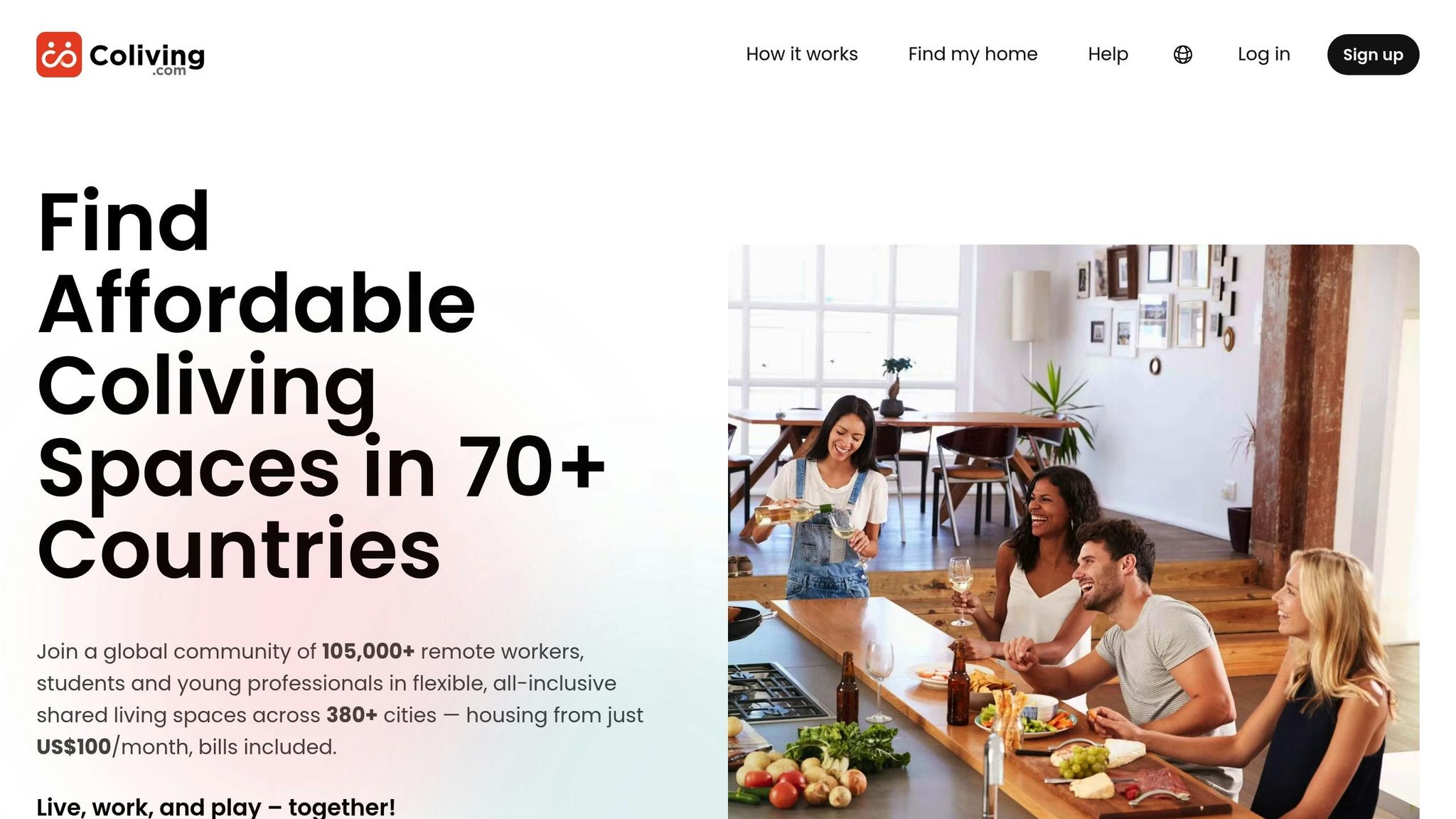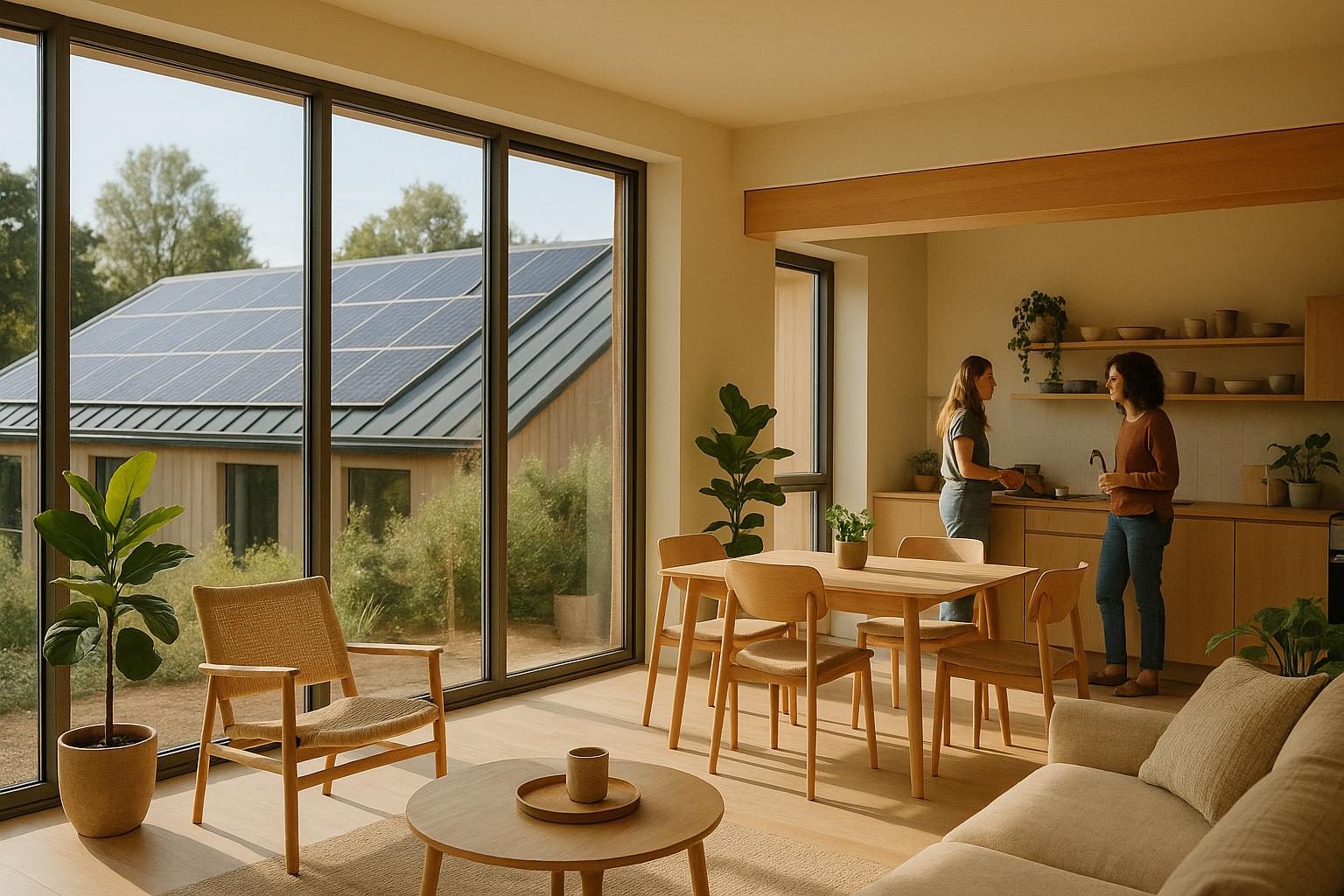Group events in coliving spaces are designed to connect residents, build relationships, and create a sense of community. These events range from professional workshops and skill-sharing sessions to recreational activities like yoga, cooking nights, or game tournaments. They not only improve social interaction but also provide opportunities for personal growth, networking, and relaxation.
Key Takeaways:
- Why They Matter: Events help residents feel connected, reduce isolation, and improve satisfaction.
- Types of Events: Professional skills, wellness, creative arts, language exchanges, and social activities.
- Planning Tips: Know resident interests, set clear goals, manage budgets, and choose the right timing and location.
- Challenges: Scheduling conflicts, cliques, and cultural differences can arise but can be managed with good communication and inclusivity.
Group events are a simple way to transform coliving spaces into vibrant communities. Whether you're attending or organizing, these gatherings enhance the overall living experience and leave lasting impacts on both personal and professional levels.
How to Plan and Organize Group Events
Organizing group events in coliving spaces can be a rewarding experience when done thoughtfully. The trick is to balance the needs and interests of the community while managing the practicalities of planning. It’s all about creating opportunities for people to connect in meaningful ways.
Key Steps in Event Planning
Start by getting to know your community. Conduct a quick survey to find out what residents are interested in and the types of events they’d like to attend. This helps ensure your efforts are focused on activities people will actually enjoy.
Set clear goals for each event. Are you aiming to help new residents feel at home, encourage networking, or simply provide a fun way to unwind? These objectives will shape your decisions throughout the planning process.
Budgeting is another important step. You don’t need a big budget to host successful events - creativity often trumps expensive resources. Plan for essentials like materials, food, and any extra costs, keeping things simple and cost-effective.
Timing matters too. Professional gatherings often work best on weekday evenings (6–8 PM), while recreational activities are great for weekend afternoons. Make sure to announce events at least a week ahead of time to give everyone enough notice.
Choosing the right location within your coliving space also plays a big role. Common rooms with flexible seating are perfect for collaborative activities, outdoor areas are great for casual mingling, and kitchen spaces work well for cooking events. Match the space to the vibe and size of your event.
| Planning Stage | Key Actions | Tips |
|---|---|---|
| Initial Setup | Survey interests and assess spaces | Pick areas that encourage interaction |
| Promotion | Share event details through local channels | Announce early to boost attendance |
| Resources | Gather materials and check equipment | Test everything in advance |
Once you’ve got the basics covered, assign roles to keep everything running smoothly.
Roles and Responsibilities in Event Organization
To pull off a successful event, it’s essential to divide responsibilities among a small team where everyone knows their role and deadlines.
- Team Captain/Event Manager: Acts as the main coordinator, setting goals, managing the budget, and ensuring all the pieces come together.
- Project Coordinator: Focuses on logistics, tracking deadlines, sending reminders, confirming RSVPs, and making sure nothing is overlooked.
- Program Administrator: Manages food orders, sets up spaces, and handles registrations.
- Creative Committee: Takes charge of promotion by designing flyers, creating social media posts, and generating excitement.
- Operations Liaison: Oversees setup, cleanup, and crowd management, arriving early and staying late to ensure everything runs smoothly.
Good communication is key. Use tools like WhatsApp, Slack, or email to keep everyone connected, and schedule regular check-ins to address any potential issues before they escalate. Clear roles and open communication not only make planning easier but also help build a stronger sense of community.
Tips for Creating Diverse and Welcoming Event Calendars
Once you’ve mastered the basics of planning and organizing, focus on creating a calendar of events that appeals to a wide range of interests and backgrounds. The aim is to ensure there’s something for everyone, making all residents feel included.
Offer a variety of event types. Combine social activities like movie nights and game tournaments with skill-building workshops and wellness sessions. By mixing high-energy events with quieter, more intimate gatherings, you can cater to both extroverts and introverts.
Be mindful of inclusivity. For food-related events, ask for dietary preferences in advance and accommodate options like vegan, vegetarian, halal, and kosher. When inviting speakers or workshop leaders, consider diversity in gender, ethnicity, age, and professional experience to ensure everyone feels represented.
Accessibility matters too. Schedule events at different times to accommodate varying work schedules, and include free or low-cost options to avoid financial barriers. Provide multiple ways for residents to participate, whether through leading discussions or joining smaller group activities.
Collaborating with local organizations can also broaden your event offerings. Partnering with community centers, local businesses, or nonprofits can bring in fresh ideas and resources without overstretching your team.
Finally, gather feedback regularly to keep improving. Use informal chats, quick surveys, or suggestion boxes to hear what residents think. Pay attention to quieter voices that might not always be heard in group settings.
The best event calendars grow and adapt based on what residents want and need. Stay flexible and open to new ideas, all while keeping the focus on fostering a connected and vibrant coliving community.
Popular Types of Group Events in Coliving
Coliving events range from laid-back gatherings to purposeful learning sessions, creating opportunities for both personal connections and professional growth. Knowing the different event types can help you pick activities that best suit your community's vibe.
Community-Building Activities
These events are all about creating meaningful connections by bringing people together through shared experiences. They provide a relaxed atmosphere where residents can move beyond small talk and build genuine relationships.
Shared meals are a classic way to connect. Whether it’s an international cooking night where residents show off their culinary traditions, a potluck where everyone contributes a dish, or a casual Sunday brunch, these gatherings encourage cultural exchange and deeper conversations.
Local exploration tours are another favorite. They help residents bond while discovering their surroundings. For instance, iSlow coliving in Spain organizes hiking tours that combine adventure with opportunities to connect.
Cultural exchange nights celebrate the diversity of coliving communities. These might include language exchange sessions, storytelling about different home countries, or demonstrations of unique traditions. Such events allow residents to experience cultures they might not have encountered otherwise.
These activities are more than just fun - they help combat isolation and foster real connections. Next, let’s look at how coliving spaces tap into their residents’ skills for professional development.
Skill-Sharing and Professional Development Events
Beyond social bonding, coliving spaces often encourage professional growth through skill-sharing and learning opportunities. These events leverage the varied expertise of residents, creating an environment where everyone can learn and contribute.
Workshops are a staple of these events, covering practical skills that residents can apply immediately. Topics might include web development, UX design, SEO, project management, public speaking, or strategies for remote work like using collaboration tools effectively.
Mentoring circles offer a more personal touch. Here, experienced professionals share advice and insights in small groups, giving participants the chance to ask questions and get tailored guidance.
Networking events provide a platform for residents to expand their professional connections, often leading to collaborations that extend far beyond the coliving space.
| Skill Category | Popular Topics | Learning Format |
|---|---|---|
| Digital Skills | Web development, UX design, SEO | Workshops |
| Business | Project management, public speaking | Mentoring circles |
| Remote Work | Collaboration tools, productivity techniques | Hands-on training |
These events thrive on mutual exchange - residents often find themselves both teaching and learning, which strengthens the community as a whole.
Recreation and Wellness Activities
To balance the often work-centered atmosphere of coliving, recreational and wellness events aim to help residents relax, recharge, and stay healthy - both physically and mentally.
Fitness activities are a popular choice. Group yoga sessions create a calm start or finish to the day, while high-energy HIIT classes bring residents together through shared challenges. In some locations, like Maraya Coliving in Tenerife North, residents even share surfing tips as part of their fitness routine.
Game nights and entertainment offer a more laid-back way to unwind. Board game tournaments encourage friendly competition, while movie nights in shared spaces recreate the cozy feel of a theater outing.
| Category | Activities | Impact |
|---|---|---|
| Culinary | International cooking, potlucks | Shared meals and connections |
| Fitness | Yoga, HIIT, surfing | Physical wellness and camaraderie |
| Languages | Conversation practice, cultural exchange | Broader global understanding |
With a mix of recreational and wellness options, coliving spaces ensure there’s something for everyone, helping residents find balance and strengthen their ties to the community.
Benefits and Challenges of Coliving Group Events
Group events in coliving spaces can create a vibrant, supportive community, enriching the living experience for everyone involved. However, these gatherings also come with their own set of challenges. Understanding both the upsides and potential hurdles can help you make the most of coliving life while addressing any issues that may arise.
Advantages of Group Events
One standout perk of coliving group events is their ability to reduce feelings of loneliness. Shared experiences naturally pave the way for meaningful connections that often extend far beyond the coliving arrangement itself.
Another major benefit is professional networking. Events like skill-sharing workshops can spark collaborations, job leads, or even business partnerships - offering unique opportunities for entrepreneurs and remote workers to grow their careers.
Group activities also promote well-being. From fitness classes to wellness sessions and social gatherings, these events build a sense of belonging and support, which is especially valuable for digital nomads and remote professionals who might otherwise feel isolated.
Cultural exchange is another highlight. Events that celebrate diverse traditions and perspectives not only broaden horizons but also help residents develop better cross-cultural communication skills.
Interestingly, group events can even turn residents into advocates for the community. For example, one U.S.-based resident invited five friends to a coliving space after attending a successful local event, showcasing how these gatherings can extend the community's reach.
However, with all these benefits come challenges that require thoughtful management.
Challenges and How to Address Them
While group events can be rewarding, they’re not without complications. Scheduling conflicts are a common issue, particularly in communities with residents spread across different time zones or juggling varied work hours. Overloading the calendar can also lead to event fatigue, especially if the responsibility for organizing falls on just a few individuals. To address this, communities can create diverse event schedules with multiple options throughout the week and rotate leadership roles to share the workload.
Another challenge is the formation of cliques, which can leave newcomers feeling excluded. Open communication and structured integration programs - sometimes supported by tools like personality assessments - can help ensure everyone feels welcome and included.
Cultural differences or varying expectations can also lead to conflicts during events. Establishing clear house rules and offering conflict resolution training for community managers and active residents can go a long way in preventing and resolving these issues.
Ultimately, the secret to overcoming these challenges lies in fostering a strong sense of community. Thoughtful planning, inclusive practices, and a spirit of collaboration can help coliving spaces unlock the full potential of group events while minimizing the downsides.
Comparison Table: Pros and Cons of Group Events
| Benefits | Challenges | Solutions |
|---|---|---|
| Reduces loneliness and isolation | Scheduling conflicts across time zones | Create diverse event calendars with multiple options |
| Encourages professional networking | Event fatigue and organizer burnout | Rotate leadership roles and share responsibilities |
| Boosts mental and physical well-being | Clique formation excluding newcomers | Use structured integration programs and personality tools |
| Promotes cultural exchange and growth | Conflicts from cultural misunderstandings | Set clear house rules and provide conflict resolution training |
| Inspires community advocacy and referrals | Over-programming leading to low attendance | Plan strategically with input from residents |
The success of group events in coliving spaces depends on striking the right balance between structure and flexibility. With careful planning and a focus on inclusivity, communities can ensure the benefits far outweigh the challenges.
Making the Most of Your Coliving Experience Through Group Events
Group events can turn coliving spaces into lively communities where real connections thrive. Whether you're a seasoned resident or new to the experience, engaging with these events can elevate your time in a coliving space and help you form relationships that last.
Best Practices for Participation
Being part of group events is more than just attending - it's about actively engaging and contributing to the shared environment. The key to meaningful connections is focusing on shared experiences rather than forcing conversations.
- Pick activities that suit your interests. Into fitness? Join or host a morning yoga session. Love food? Take part in communal dinners where residents showcase dishes from their home countries. These activities naturally bring people together without the awkwardness of formal introductions.
- Show genuine curiosity about others. Listen actively and ask open-ended questions about their lives, travels, or work. This is especially effective during coworking sessions, where casual chats can lead to unexpected collaborations or friendships.
- Share your skills and interests. If you're great at photography, offer to capture moments from events. Speak another language? Start a language exchange group. Hosting a movie night or leading a creative workshop can also bring the community closer.
- Strike a balance. While participating in events is important, don't feel pressured to join everything. Prioritize activities that genuinely excite you to avoid burnout.
- Be thoughtful toward others. Help with event setup or cleanup, respect cultural differences during themed events, and make an effort to include newcomers in conversations. These small acts create a welcoming environment for everyone.
These practices not only help you enjoy the events but also make it easier for others to feel at home in the community.
Tips for Newcomers to Join the Community
Moving into a coliving space can feel overwhelming, especially when others already seem to know each other. But you're not alone - studies show that 24% of adults worldwide often feel lonely, and relocation is a major trigger. Recognizing this can help you approach the situation with patience and understanding.
- Say yes to invitations. Whether it's a game night or a weekend outing, accepting invites can lead to a greater sense of belonging over time. Even if you're naturally introverted, these moments can help you ease into the community.
- Start small. Begin with one-on-one chats, like during morning coffee in the shared kitchen, before diving into larger events. These smaller interactions can make bigger gatherings feel less intimidating.
- Set realistic expectations. Instead of focusing on feeling comfortable right away, aim to be open and approachable. Prepare a few conversation starters about your background or interests to make interactions easier.
- Join shared activities. Cooking sessions, fitness classes, or coworking hours provide a natural way to connect without the pressure of small talk.
- Look for common ground. Shared interests, similar schedules, or complementary skills can be great conversation starters. If someone works in your field, suggest grabbing coffee to exchange ideas.
- Get involved. Volunteering for tasks like organizing events or maintaining shared spaces gives you a role in the community and helps you meet like-minded residents. Plus, studies show that 76% of people who volunteer feel healthier and report better social well-being.
By taking these steps, you can ease into the social fabric of your coliving space and make the most of your experience.
How Coliving.com Supports Group Events

The right platform can make all the difference in creating a strong community experience. Coliving.com, with its network of over 1,700 communities in 360+ cities, connects people to spaces designed to foster both personal and professional growth.
- Tailored searches for your lifestyle. Advanced filters help you find communities that align with your interests, whether you're a digital nomad, remote worker, or entrepreneur. This ensures you land in a space where group events match your goals.
- Resident reviews. Verified testimonials from past residents give you a clear picture of the community vibe, the types of events hosted, and how welcoming the space is for newcomers.
- Nomad hubs and coworking spaces. These locations often feature regular events and experienced community managers who know how to bring people together.
- Detailed amenities. The platform highlights spaces with dedicated areas for workshops, fitness classes, or social gatherings, so you know what to expect before booking.
- Global network. With over 39,000 rooms in 70+ countries, Coliving.com enables you to maintain community connections even as you travel. Participating in events at one location can build your confidence for joining new spaces as you move.
Coliving.com simplifies the process of finding a community that aligns with your needs, making it easier to dive into group events and enjoy the benefits of coliving.
Conclusion: Key Takeaways on Coliving Group Events
Group events turn coliving spaces into more than just shared housing - they create thriving communities where connections truly thrive. Take this example: a coliving space in London found that 68% of its residents felt their social lives improved thanks to regular events. This shows how structured activities can leave a lasting positive impact on well-being.
Shared experiences are the glue that binds these communities together. From fitness sessions to communal meals, these activities foster what one resident described as "beautiful communal energy." These aren't just fleeting moments; they lay the groundwork for deep friendships and even professional networks that can endure long after your stay.
"We shared unforgettable moments together, like yoga classes, meditation sessions, hikes, and dinners that really imbued the place with a beautiful communal energy." - Dorothée B.
Your participation is key to making the most of these events. Whether you're helping organize, leading a workshop, or simply showing up regularly, your involvement shapes not only your experience but also the collective energy of the community.
The variety of events ensures there's something for everyone. Professional workshops can help you advance in your career, while wellness-focused activities offer a chance to recharge. Whether you're looking to network, explore creative outlets, or unwind after a busy day, there's an event to match your interests.
For newcomers, these events are a natural way to integrate quickly and build lasting friendships. The structured format takes away the awkwardness of forced small talk, creating organic opportunities to connect. Many residents highlight the warmth and inclusivity they feel, making it easy to settle in and form meaningful relationships.
"The people are incredibly kind and the owner and staff do everything they can to make sure everyone feels a part of a special community. And I certainly felt that warmth - I made friends instantly and truly enjoyed every moment." - Angela G.
The impact of these events goes beyond the here and now. The connections, skills, and memories you gain often shape your personal and professional life for years to come. With curated spaces available through Coliving.com, you can continue to grow your community-building skills across their network of over 1,900 spaces in 380+ cities.
At its core, group events are what make coliving unique - they transform a collection of strangers into a supportive, vibrant community. By embracing these opportunities, you're not just enhancing your living experience; you're building relationships and memories that will enrich your life far into the future. Dive in and watch everyday interactions turn into something truly special.
FAQs
How can coliving spaces create inclusive events and appeal to a variety of resident interests?
Coliving spaces can create a sense of belonging and bring people together by organizing events that celebrate the diversity of their residents. These could range from cultural celebrations and skill-sharing workshops to fun group activities like cooking nights or fitness classes. Tailoring events to the interests and backgrounds of the community makes it easier for everyone to feel included.
To make sure all residents feel at home, clear communication is key - especially when it involves offering information in multiple languages if needed. Events can also be more inclusive by considering dietary preferences and actively seeking input from residents to plan future activities. A mix of relaxed, informal gatherings and more structured events ensures there’s something for everyone, making it easier to connect and build meaningful relationships.
How can scheduling conflicts and social cliques be managed during coliving group events?
Managing Scheduling Conflicts
One of the best ways to handle scheduling conflicts is by setting up a shared calendar that everyone can access. Make sure to involve the whole group when deciding on event times, so the schedule works for as many people as possible. Open communication is crucial here - encourage group discussions to ensure everyone feels heard and included.
Tackling Social Cliques
To prevent or minimize social cliques, focus on organizing activities that bring everyone together. Choose events that cater to a variety of interests and encourage interaction among all members. Icebreaker games and team-based activities are great tools to help people connect, especially those who might not know each other well. Creating a welcoming environment and addressing any issues early on can go a long way in building a stronger sense of community within your coliving space.
How do group events in coliving spaces support personal growth and professional networking?
Group events in coliving spaces open the door to personal growth by building a sense of community, sparking self-reflection, and supporting mental well-being. Activities like workshops, shared meals, or cultural exchanges give residents the chance to form deeper connections and create meaningful bonds.
These gatherings also naturally encourage professional networking. Whether through casual daily conversations or planned meetups, residents can share ideas, collaborate on projects, and develop relationships that might lead to career opportunities. The blend of personal enrichment and professional connections makes coliving events an enriching experience for those eager to grow in both aspects of life.






